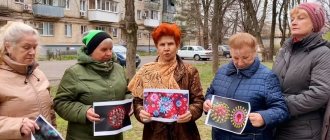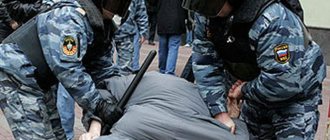RESPONSIBILITY FOR INVOLVEMENT AND COMMITMENT OF TERRORISM
May 6, 2019
RESPONSIBILITY FOR INVOLVEMENT AND COMMITMENT OF TERRORISM
A terrorist act (Article 205 of the Criminal Code of the Russian Federation) is the commission of an explosion, arson or other actions that frighten the population and create the danger of death, causing significant property damage or other grave consequences, in order to destabilize the activities of authorities or international organizations or influence their adoption decisions, as well as the threat of committing the specified actions for the same purposes - is punishable by imprisonment for a term of 15 to 20 years with restriction of freedom for a period of one to two years or life imprisonment.
A person who participated in the preparation of a terrorist act is exempt from criminal liability if he, by timely warning the authorities or in another way, contributed to the prevention of the terrorist act and if the actions of this person do not contain another crime.
Also, the Criminal Code of the Russian Federation provides for severe punishment for the following crimes:
Article 205.1 of the Criminal Code of the Russian Federation “Promotion of terrorist activities” - punishment from 15 to 20 years or life imprisonment.
Article 205.2 of the Criminal Code of the Russian Federation “Public calls for terrorist activities, public justification of terrorism or propaganda of terrorism” - punishment in the form of imprisonment for a term of up to seven years with deprivation of the right to hold certain positions or engage in certain activities for a term of up to five years.
Article 205.3 of the Criminal Code of the Russian Federation “Completing training for the purpose of carrying out terrorist activities” is punishable by imprisonment for a term of fifteen to twenty years with restriction of freedom for a period of one to two years or life imprisonment.
Article 205.4 of the Criminal Code of the Russian Federation “Organization of a terrorist community and participation in it” - punishment in the form of imprisonment for a term of fifteen to twenty years with a fine in the amount of up to one million rubles or in the amount of wages or other income of the convicted person for a period of up to five years or without such and with restriction of freedom for a term of one to two years or life imprisonment.
Article 205.5 of the Criminal Code of the Russian Federation “Organization of the activities of a terrorist organization and participation in the activities of such an organization” - punishment in the form of imprisonment for a term of ten to twenty years with a fine in the amount of up to five hundred thousand rubles or in the amount of wages or other income of the convicted person for a period of up to three years or without it.
Article 206 “Hostage-taking” - punishment in the form of imprisonment for a term of fifteen to twenty years with restriction of freedom for a period of one to two years or life imprisonment.
468 06.05.2019 05:15:00
comments powered by HyperComments
“Prisonings for reposting” are being transformed into “justification for terrorism”
Human rights activists note that the partially decriminalized Article 282 of the Criminal Code of the Russian Federation is gradually being replaced by a more severe article - 205.2 on the justification of terrorism, under which they began to persecute “inconvenient” journalists, activists and even deputies.
2019 began not only with a positive trend - the closure of a number of cases under the “extremist” Article 282 of the Criminal Code of the Russian Federation (“Inciting hatred and enmity”), but was also marked by a new vector of attracting citizens for online publications.
It was impossible not to notice high-profile cases against activists banned in Russia or given the status of “undesirable” organizations (“Jehovah’s Witnesses”, “Open Russia”, etc), sometimes accompanied by tragic events that defy any logical explanation; the next round of catching representatives of various kinds of youth movements and the continuation of trials of those previously detained (“Network”, “New Greatness”, etc.); initiation of cases under the “Dadin” article on alleged violation of the law on rallies for publication on the Internet that had nothing to do with the call for illegal actions; but we will focus on another worrying point.
Many human rights activists previously warned about the “cosmetic” nature of the partial decriminalization of Article 282 initiated by Russian President V.V. Putin, since: a) with its transfer to the Code of Administrative Offenses, there will be more cases and they will be more difficult to yield to public control; b) there will still be a whole package of criminal articles, much more serious - for example, since the beginning of the New Year, several criminal cases have been opened against Internet activists, journalists and even deputies under Article 205.2 of the Criminal Code of the Russian Federation “Public calls for terrorist activities or public justification of terrorism” "
The head of the international Agora, Pavel Chikov, calls 205.2 “the new 282nd”:
“I talked about this many times. There will be more cases of calls for extremism and justification of terrorism. The FSB has eliminated its competitors in the form of the Center for Criminal Investigation and the Investigative Committee (investigating cases under Article 282) and now has a monopoly on criminal cases for words.”
.
“Until the fall of 2022, the number of criminal cases under extremist Article 282—the so-called “cases for reposts”—increased in Russia. But after Vladimir Putin promised to decriminalize the article, the number of such cases dropped almost to zero very sharply. But instead of the Ministry of Internal Affairs with Article 282, the FSB was closely involved in the fight against “incorrect” statements and “incorrect” explanations. A new article was also found,” journalist Timur Olevsky on the air of the next episode of the TV show “Current Time”.
“...the repeal of Article 282 did not lead to the state abandoning the practice of persecuting people for their words,” says Kirill Martynov, . — The Criminal Code has accumulated a sufficient number of offenses under which people can be held accountable for texts on the Internet. One of the most “promising” in this regard is Article 205.2, adopted in 2006 during the first wave of the Russian “fight against extremism” and providing for up to 7 years of imprisonment for publicly justifying terrorism on the Internet.” How broadly the security forces intend to interpret the “justification of terrorism” can be seen in the case of Svetlana Prokopyeva, he also notes.
“205.2 is a more severe article than 282, the maximum penalty for which (in case of repeated violation after administrative liability) today remains five years in prison. In addition, it is much more convenient to manipulate public opinion by presenting people like Prokopyeva as “terrorists.” Everyone is afraid of terrorists, and no one understands who an extremist is, not even a citizen legislator,” the journalist believes.
Recently it became known that a criminal case has been initiated under this article against Radio Liberty correspondent and former editor-in-chief of Pskov Province Svetlana Prokopyeva . She was also searched.
The reason for this and other cases, already under the Code of Administrative Offenses against “Echo of Moscow in Pskov,” was the journalist’s speech at this radio station last fall. In her words, the investigation found justification for the explosion in the reception room of the FSB directorate for the Arkhangelsk region. The text version of the broadcast was published on Prokopieva’s blog on the Pskov News Feed.
.
The trade union is collecting signatures in support of journalist Svetlana Prokopyeva (Pskov Province, Radio Liberty). We consider the accusations of “justifying terrorism” to be absurd and demand that the persecution of the journalist be stopped. Sign in support of your colleague! https://t.co/xWLsqab61t
— Union of Journalists (@PZhurnalist) February 7, 2019
.
This criminal case has caused a wide resonance in the human rights and journalistic communities, which consider it a manifestation of censorship, unjustified repression of a person who has a point of view different from the opinion of the authorities, and demand that the persecution of the journalist be stopped.
The Human Rights Council under the President of the Russian Federation will contact the prosecutor's office and the investigative committee in connection with the case of Pskov journalist Svetlana Prokopyeva, said HRC member Ekaterina Vinokurova . “The HRC will send requests to the prosecutor’s office and the Investigative Committee,” she said.
At the beginning of November last year, 24-year-old anarchist Vyacheslav Lukichev . Lukichev told the lawyer that the security forces were trying to connect him with the perpetrator of the terrorist attack in Arkhangelsk, with whom they “seemed to be communicating in a general chat.” A criminal case was opened against him because of a “screenshot with a suicide letter” from the perpetrator of the terrorist attack in Arkhangelsk. In the same post, Lukichev called the perpetrator of the terrorist attack a “real hero.”
In the Pskov region, a trial will take place over municipal deputy Arkady Markov , accused of justifying terrorism. The case will be considered by judges of the Moscow District Military Court in the building of the Pskov Regional Court.
Arkady Markov, a member of the Assembly of Deputies of the city of Ostrov, had previously repeatedly made statements about non-recognition of the Russian Federation and called himself a citizen of the USSR. The reason for initiating a criminal case was the posting on the Internet of a video excerpt from the feature film “The Game. Revenge" and comments to it. In the film, the main character accuses another - an FSB officer - of treason against the Soviet Motherland and kills him.
Pskov FSB officers installed a video camera in a room belonging to Markov and recorded his statements, which were interpreted as approval of the murder in a feature film. A criminal case was initiated under Part 2 of Art. 205.2 of the Criminal Code of the Russian Federation (public calls for terrorist activities, public justification of terrorism or propaganda of terrorism committed using the media or the Internet).
The deputy clarified that the video camera was secretly installed in the premises where he lives and works. However, the prosecutor's office, responding to the defendant's complaint, refused to consider this a dwelling.
“Without my knowledge, FSB officers break into my home and secretly install a camera. What can we call this if not fascism, or, to put it simply, complete lawlessness? In fact, I had been monitored for many years, and eventually the results were required. So they “pulled” the first publication they came across,” said Arkady Markov.
Earlier in Yekaterinburg, FSB officers detained local resident Andrei Zlokazov , who called himself the head of the Sverdlovsk region and chairman of the KGB. His calls for “restoration of the constitutional order of the USSR” were interpreted under the article of the Criminal Code of the Russian Federation “Public calls for extremist activities.” As part of the investigation into the case under the same article, searches were also carried out at Zelenograd resident Sergei Taraskin, who called himself the President of the USSR. The movement, led by Taraskin, consisted of people who declared that they remained citizens of the USSR and did not recognize the Russian Federation.
A case has been sent to the Moscow District Military Court against 19-year-old Nizhny Novgorod resident Mikhail Gerasimov , accused of justifying terrorism (Part 2 of Article 205.2 of the Criminal Code) due to provocative comments about the “Islamic State” that the young man left from fake accounts on VKontakte.
.
Instead of 282 of the Criminal Code, investigators found another article under which they will initiate cases because of the posts. @asilikedem tells the story of a Nizhny Novgorod resident who was asked to undergo compulsory treatment for comments about the Islamic State two years ago https://t.co/EzEUKQnisZ
— Mediazzona (@mediazzzona) February 7, 2019
.
The examination recognized that Gerasimov suffers from a mental disorder and was not aware of his actions; the investigation asks that he be prescribed compulsory outpatient treatment.
Unlike abstract “extremism,” terrorism causes real fear in society, and this creates opportunities for abuse, says Agora lawyer Damir Gainutdinov :
“The reform of the main anti-extremist article of the Criminal Code (Article 282 of the Criminal Code of the Russian Federation) carried out in the fall of 2022, it would seem, should have led to a decrease in the number of cases with a political reputation. Indeed, the introduction of the principle of administrative prejudice resulted in the forced termination of dozens of significant criminal cases.
However, the decline will inevitably be compensated, and another article will help this - “On calls for terrorist activities” (Article 205.2 of the Criminal Code of the Russian Federation). Now attention has been drawn to her due to searches of the Pskov journalist Svetlana Prokopyeva, who was suspected of justifying the act of an Arkhangelsk teenager who committed a suicide bombing in the reception room of the local FSB Directorate. But the use of “two hundred and five second” already has its own history.”
This article, recalls the Agora lawyer, appeared in the Russian Criminal Code quite a long time ago - in 2006. “Oddly enough, this was a consequence of the conscientious implementation of the Council of Europe Convention on Countering Terrorism: in accordance with the international treaty, Russia undertook to establish criminal liability for deliberate incitement to terrorist crimes,” notes Gainutdinov. Over the next decade, the article remained “exotic”: from 2010 to 2015, less than three dozen people were convicted under it.
The main “working” anti-extremist articles remained 280 (calls for extremist activity) and 282 (incitement of hostility and humiliation of dignity) of the Criminal Code of the Russian Federation. However, since about 2016, the situation has changed and the number of cases under Article 205.2 has increased. Cases under Article 205.2 are considered by one of the four district military courts (Far Eastern, Moscow, Volga or North Caucasian), as a rule, in the shortest possible time and in conditions extremely unfavorable for the defense. The distance from the defendant’s place of residence also adds problems.
Part 2 of this article, which involves the use of the Internet, is classified as a serious crime. This means that the accused can be kept in custody for up to a year, and the statute of limitations for criminal prosecution is ten years (and not six, as under Article 282), which provides ample opportunities for identifying new episodes.
“The article is also convenient because,” Damir Gainutdinov emphasizes, “it plays on one of the main phobias of our time - terrorism. The fight against terrorist propaganda is a very convenient way to justify the persecution of dissent. There is already a wide range of potential defendants - members of anarchist, libertarian, right-wing and left-wing movements. Most of them are well known to the authorities; it is easy to open operational records on them, monitor their social networks, and introduce agents into their environment. All this allows, if necessary, to instantly initiate a large number of new criminal cases.”
From this point of view, propaganda of terrorism looks much more preferable in comparison with other new offenses, such as participation in the activities of an undesirable organization (Article 284.1), evasion of the duties of a “foreign agent” (Article 330.1), repeated violation of the rules of participation in rallies (Article 212.1) and even inducement to suicide (Articles 110.1 and 110.2).
“Unlike these “unconventional” compositions, there are already proven investigative technologies, methodological recommendations for conducting examinations, established judicial practice, and even clarifications of the Supreme Court to justify terrorism,” the human rights activist sums up.
There is a certain difficulty in monitoring such cases due to the lack of details when covering them in the press - approximately the same situation was with Article 282, when law enforcement officers reported to journalists about the exposure of another online extremist, but it was difficult to assess the legality of their actions if there was no certain resonance like “ Motuznaya’s case,” which led to the disclosure of details about two more Barnaul “extremists.” However, the same applies to the “demonstration of Nazi symbols,” which in some cases is actually connected with the online activities of fans of radical views of Russians, and in others with the publication of cartoons, “photographs,” and memes, the purpose of which is not “rehabilitation of Nazism.” is.
Recently, the Investigative Department of the Federal Security Service of Russia for the Magadan Region completed an investigation into a criminal case for committing a crime under Part 1 and Part 2 of Art. 205.2 of the Criminal Code of the Russian Federation. “During the operational search activities, it was established that on the personal page of the social network “VKontakte”, a resident of the regional center posted materials containing justification for the actions of members of the international terrorist organization “Islamic State”, banned on the territory of the Russian Federation,” the press service reports. FSB Directorate for the Magadan Region. No other details of the case have been released.
The North Caucasus District Military Court, as we wrote earlier, terminated due to partial decriminalization the criminal case of Yevgeny Karakashev on charges of inciting hatred towards a social group (Part 1 of Article 282 of the Criminal Code of the Russian Federation), but will continue to consider his case of calls for terrorist activities. activities using the Internet (parts 1 and 2 of Article 205.2 of the Criminal Code of the Russian Federation).
The reason for the criminal prosecution of an activist from Yevpatoria, Yevgeny Karakashev, was an untitled video file published on VKontakte (at the end of 2014), a text (in January 2022) and the “last interview of Primorye partisans,” previously recognized by the court as extremist material.
According to lawyer Alexey Ladin, Karakashev himself connects the initiation of a criminal case against him and the subsequent arrest with his activities to prevent the development of a resort area near Yevpatoria in the vicinity of a salt lake. The case was initiated on January 31 last year, and on February 1, the day of public hearings on the development issue, Karakashev was detained.
It is quite possible that in the near future, the authorities’ equating the statements of journalists and social activists, as in the Prokopyeva case, with posts by supporters of the terrorist organization ISIS, banned in the Russian Federation, will become in the eyes of Russian society another delegitimization of the anti-terrorism article, as happened last year with anti-extremist legislation. However, the authorities do not yet hesitate to use the entire range of punitive articles to suppress different opinions on the Internet.
The same Article 282 is quite applicable locally, despite its obvious relative liberalization. Thus, in February 2022, a verdict was passed in Kirov in the case of inciting national hatred (Part 1 of Article 282 of the Criminal Code). In the dock was a 21-year-old local resident who, according to law enforcement agencies, from January to March 2022 published statements and images on a social network directed against representatives of a certain ethnic group. Details were not provided. The young man fully admitted his guilt. The court sentenced him to 2 years of suspended imprisonment. The “Sova” news agency, which monitored the Network for prosecution for posts on the Internet, Fr.
A resident of Vladivostok was summoned to the city prosecutor’s office under the new article 20.3.1 of the Administrative Code, introduced instead of 282 of the Criminal Code of the Russian Federation, for posting a comment on the Internet with signs of “inciting hatred or enmity, as well as humiliation of human dignity.” “The prosecutor calls, selects an explanation, and sends the case to court. Punishment up to 15 days of arrest. Innovations have reached Vladivostok,” Pavel Chikov comments on this case in his Telegram channel.
Judging by all the signs, the experts’ fears are beginning to come true - the authorities, having accepted a slight liberalization in the issue of “anti-extremist” legislation, are tightening their grip in other areas, not forgetting, however, about the “decriminalized” Article 282.
Acquittal of a convicted person under Art. 242, 242.1 of the Criminal Code of the Russian Federation in the cassation instance with the right to rehabilitation.
case No. 77-1042/2020
DECISION of the court of cassation
Kemerovo June 17, 2022
Judicial panel for criminal cases of the Eighth Court of Cassation of General Jurisdiction, consisting of: presiding Lazareva O.N., judges Starchikova E.V., Tseneva E.V., with the participation of: prosecutor Ushakova E.S., defense lawyer Vlasov A.N. ., who presented certificate No. 1621 dated June 5, 2012 and order No. 30 dated June 11, 2020, with the secretary of the court session Koval A.N. considered in open court the cassation appeal of lawyer A.N. Vlasov. in defense of the convicted S-va G.A. on the verdict of the Sovetsky District Court of Krasnoyarsk dated March 4, 2022.
Having heard the report of judge Lazareva O.N., the opinion of lawyer Vlasov A.N., who insisted on satisfying the cassation appeal, the opinion of prosecutor Ushakova E.S., who considered it necessary to cancel the court verdict, the criminal case against S. G.A. stop due to the absence of corpus delicti in his actions with recognition of his right to rehabilitation, judicial panel
INSTALLED:
by the verdict of the Sovetsky District Court of Krasnoyarsk dated March 4, 2019, S-in G... A..., born —— in ———, citizen of the Russian Federation, unconvicted: convicted using Art. 64 of the Criminal Code of the Russian Federation according to: - clause “b”, part 3, art. 242 of the Criminal Code of the Russian Federation to 1 year 6 months of imprisonment - clauses “a”, “d”, part 2 of Art. 242.1 of the Criminal Code of the Russian Federation, 2 years of imprisonment. Based on Part 3 of Art. 69 of the Criminal Code of the Russian Federation for the totality of crimes, by partial addition of the imposed punishments, 2 years and 2 months of imprisonment were finally imposed to serve the sentence in a general regime correctional colony. The preventive measure chosen was detention. The sentence was calculated from March 4, 2019.
Based on paragraph “b” of Part 3.1 of Art. 72 of the Criminal Code of the Russian Federation, the time of detention of S-va G.A. in custody from the moment of detention until the entry into force of the sentence is counted towards the term of imprisonment at the rate of one day of detention for one and a half days of serving the sentence in a general regime correctional colony, taking into account Part 3.3 of Art. 72 of the Criminal Code of the Russian Federation. Issues regarding the imposition of procedural costs and the fate of material evidence were resolved. The sentence was not reviewed on appeal.
In the cassation appeal, lawyer Vlasov A.N. in defense of the convicted S-va G.A. expresses disagreement with the court verdict, citing significant violations of criminal and criminal procedural law committed by the court. Believes that the court, satisfying the petition of S-va G.A. on consideration of a criminal case in a special judicial procedure, in violation of Art. 316 of the Code of Criminal Procedure of the Russian Federation was not convinced that the charge with which the defendant agreed was justified and supported by evidence collected in the criminal case. Indicates that S-v G.A., downloading and storing files with pornographic images on a personal computer, did not take actions aimed at transferring them to third parties, and used these files exclusively for personal viewing. The descriptive and motivational part of the verdict also does not contain an indication that S-ev G.A. transferred files of pornographic content in his possession to someone.
Notes that the crimes provided for in Art. 242, 242.1 of the Criminal Code of the Russian Federation can only be committed with direct intent; committing the actions specified in the disposition of these articles with indirect intent does not entail criminal liability. Referring to Art. 2 of the Law of the Russian Federation of December 27, 1991 No. 2124-1 “On the Mass Media”, the explanations given in the Resolution of the Plenum of the Supreme Court of the Russian Federation dated June 15, 2010 No. 16 “On the practice of application by courts of the Law of the Russian Federation “On the Mass Media”, draws attention to violation of the criminal law when qualifying the actions of S-va G.A. on the basis of “using the media, including information and telecommunication networks (including the Internet)”, based on the erroneous understanding that the use of Internet resources is an alternative qualifying feature in relation to the use of the media, while, on the contrary, the use of information and telecommunication networks (including the Internet) is one of the ways to use the media, but this requires registration of an Internet resource as a mass media. The complaint asked to cancel the sentence and send the criminal case for a new trial; in the court of cassation he asked to cancel the verdict, to terminate the criminal case due to the absence of S-va G.A. elements of a crime.
Having checked the materials of the criminal case, the arguments of the cassation appeal of lawyer A.N. Vlasov. in defense of the convicted S-va G.A. The panel of judges comes to the following conclusions. In accordance with Part 1 of Art. 401.15 of the Code of Criminal Procedure of the Russian Federation, the grounds for canceling or changing a sentence, ruling, or court decision when considering a criminal case in the cassation instance are significant violations of the criminal or criminal procedural law that influenced the outcome of the case.
In this case, violations were committed that fall within the specified criteria. By virtue of Art. 297 of the Code of Criminal Procedure of the Russian Federation, the sentence must be legal, reasonable and fair and is recognized as such if it is pronounced in accordance with the requirements provided for by the criminal procedure law and is based on the correct application of the criminal law. The court's verdict does not meet these requirements.
By virtue of paragraph 2 of Art. 49 of the Constitution of the Russian Federation, the accused is not obliged to prove his innocence. Parts 3, 4 tbsp. 14 of the Code of Criminal Procedure of the Russian Federation establishes that the burden of proof lies on the prosecution; a conviction cannot be based on assumptions.
By virtue of Part 7 of Art. 316 of the Code of Criminal Procedure of the Russian Federation, a judge, considering a criminal case in a special order, pronounces a guilty verdict if he comes to the conclusion that the accusation agreed with by the defendant is justified and supported by evidence collected in the criminal case. This provision of the law in its relationship with the provisions of Part 3 of Art. 7, Art. 11 of the Code of Criminal Procedure of the Russian Federation predetermines not only the right, but also the duty of the court in the framework of criminal proceedings in accordance with Chapter 40 of the Code of Criminal Procedure of the Russian Federation to make sure that the charge brought against a person is justified and supported by evidence collected in the criminal case that meets the requirements of Art. 74 of the Code of Criminal Procedure of the Russian Federation, and at the same time do not contain the procedural flaws listed in Art. 75 of the Code of Criminal Procedure of the Russian Federation. If the court determines that the conditions under which the petition was filed are not met, as well as if doubts arise about the validity of the charges brought, including the corpus delicti, or the reliability and admissibility of the evidence collected in the case, the court makes a decision to terminate the special procedure for the trial and appointment of consideration of a criminal case in accordance with the general procedure.
According to the verdict of S-in G.A. convicted of illegal distribution of pornographic materials, committed using information and telecommunication networks (including the Internet), as well as for distribution of materials with pornographic images of minors, committed against a person under fourteen years of age, using information and telecommunication networks (including Internet"). As follows from the verdict, S-in G.A. no later than June 19, 2022, being in his home, having access to the Internet information and telecommunications network, through a peer-to-peer program installed on his computer, which allows users to exchange files by connecting to file-sharing servers, downloaded from an unidentified Internet site " and saved in folders on his personal computer a video file containing pornographic materials without the participation of minors, as well as a video file containing pornographic materials depicting a minor under the age of fourteen, after which, for the purpose of distributing these materials, he opened access to the laptop drive specified folders, which automatically became publicly available for viewing and copying to an unlimited number of Internet users who have the corresponding program installed on their computer.
Criminal case at the request of S-va G.A. considered in a special judicial procedure provided for in Chapter 40 of the Code of Criminal Procedure of the Russian Federation. Meanwhile, the court did not take into account that the subjective side of the crimes provided for in Art. 242 and 242.1 of the Criminal Code of the Russian Federation, is characterized by the presence of direct intent on the part of the perpetrator, that is, by virtue of Art. 25 of the Criminal Code of the Russian Federation, the perpetrator must be aware of the social danger of his actions (inaction), foresee the possibility or inevitability of the occurrence of socially dangerous consequences and desire their occurrence.
However, the plot of the charge brought and the descriptive and motivational part of the verdict do not contain data that S-in G.A., downloading (copying) and storing files of a pornographic nature on his personal computer, offered or transferred them to anyone; evidence confirming that video files with images of a pornographic nature, including of minors, specified in the verdict, were distributed by the convicted person, that is, received and viewed by other specific persons as a result of the deliberate actions of the convicted person, is also absent from the criminal case materials. The court did not take into account that the presence of G.A. a computer program that allows you to download and distribute files to other users automatically, and his awareness of this, do not in themselves indicate direct intent to commit crimes under Art. 242 and 242.1 of the Criminal Code of the Russian Federation, since at the time of his acquisition (downloading, copying) of these files they were already distributed on the Internet and were freely available. In addition, the court did not take into account that, within the meaning of the law, taking into account the provisions of the Law of the Russian Federation of December 27, 1991 No. 2124-1 “On the Mass Media”, also the explanations given in the Resolution of the Plenum of the Supreme Court of the Russian Federation of June 15, 2010 No. 16 “ On the practice of application by courts of the Law of the Russian Federation “On the Mass Media”, the qualifying feature of these crimes “using the media, including information and telecommunication networks (including the Internet”) applies only to Internet resources that are registered as means mass media. However, the plot of the accusation and the descriptive and motivational part of the verdict do not contain information that S-v G.A., using his personal computer on which pornographic files were stored, was registered as a representative of the media.
Thus, G.A., brought against S. the accusation, as formulated by the preliminary investigation authorities, was not confirmed by objective evidence obtained during the preliminary investigation. However, the court, in violation of the law, did not discuss the issue of considering the case in a general manner, while there were grounds for clarifying and establishing the above circumstances, which were essential for the correct resolution of the case, and ruled a guilty verdict in accordance with Art. Z16 Code of Criminal Procedure of the Russian Federation.
Meanwhile, a conviction cannot be based on assumptions and is made only if during the trial the defendant’s guilt of committing a crime is proven. All doubts about the guilt of the accused, which cannot be eliminated in the manner established by the criminal procedure law, are interpreted in favor of the accused. The court of first instance did not take into account these circumstances, which could have significantly influenced the conclusions about the guilt of S-va G.A., which led to the imposition of an illegal sentence.
Under such circumstances, the judicial panel comes to the conclusion that the verdict against S-va G.A. and termination of the criminal case against him on the basis of paragraph 2 of part 1 of Art. 24 of the Code of Criminal Procedure of the Russian Federation due to the absence in his actions of the elements of crime provided for in paragraphs. “a”, “d” part 2 art. 242.1, clause “b”, part 3, art. 242 of the Criminal Code of the Russian Federation, with recognition for S-vym G.A. rights to rehabilitation.
Based on the above and guided by Art. 401.14 - 401.16 Code of Criminal Procedure of the Russian Federation, judicial panel
DEFINED:
cassation appeal by lawyer Vlasov A.N. in defense of the convicted S-va G.A. to satisfy. The verdict of the Sovetsky District Court of Krasnoyarsk dated March 4, 2022 in relation to S-va G... A... is cancelled, the criminal case against him is terminated on the basis of clause 2 of part 1 of Art. 24 of the Code of Criminal Procedure of the Russian Federation for the absence in his actions of the elements of crime provided for in paragraph “b” of Part 3 of Art. 242, pp. “a”, “d” part 2 art. 242.1 of the Criminal Code of the Russian Federation. S-va G…. A…. be released from custody immediately. Based on clause 4, part 2, art. 133, part 1 art. 134 of the Code of Criminal Procedure of the Russian Federation recognize the right to rehabilitation for S-vym G... A....
Chairman:
Judges:
Features of the investigation of criminal cases related to the distribution of child pornography.





